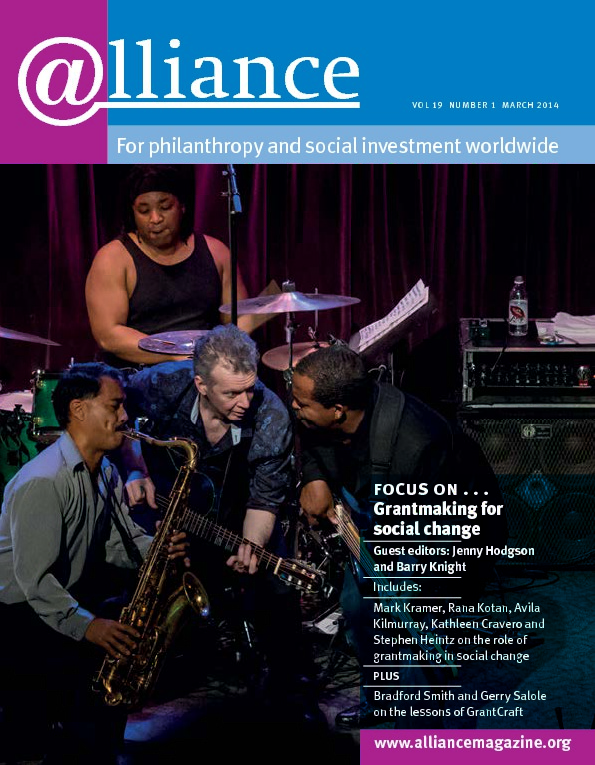For this special issue of Alliance magazine, WINGS surveyed its network participants[1] from every region around the world to better understand the views of membership associations and support organizations on the importance of grantmaking.
Such a survey, completed by 21 WINGS members from 16 different countries, was bound to reveal the diversity among regions, and even within them. It is worth noting that respondents are support organizations serving philanthropy, often representing a network of foundations at the national or regional level and therefore with the advantage of having a big-picture perspective on grantmaking.
Respondents from Africa, Europe and North America all reported that grantmaking is quite a common practice in the philanthropic sector in their regions. Latin America presented a mixed picture: while our members report that grantmaking is uncommon in Colombia, it is increasing in Brazil[2] and represents 85 per cent of philanthropic activity in Mexico. The same kind of diversity is found in Asia: while grantmaking is common in Singapore, it is quite uncommon in India.
Figure 1: How common is grantmaking in your country?

Very common: Canada, Colombia*, Finland, Italy, Mexico, Poland, Romania, Singapore, Slovakia*, South Africa, United Kingdom, USA
Quite common: Zimbabwe, Slovakia*, Russia
Quite uncommon: Colombia*
Very uncommon: India
* Countries appear twice where different respondents from the country had different viewpoints.
Responses led us to consider a possible relationship between grantmaking and the legal environment: where grantmaking was uncommon, the legal and fiscal environment was generally reported to be quite unfavourable. However, that does not apply in all cases. In Russia, for instance, grantmaking is a fairly common practice even though the legal environment for philanthropy is unsupportive. Russia, Slovakia and Colombia are the only countries where public opinion towards grantmaking was reported as unfavourable.
Figure 2: How favourable or unfavourable are the following factors in relation to grantmaking in your country?

*Please note that not all respondents answered all questions.
Strengthening civil society
The contribution of grantmaking to strengthening civil society stood out regardless of the country. Fikile Kuhlase, from the Banking Association of South Africa, notes that it can be an important tool for nation-building and nurturing social inclusion and social cohesion. Inviolatta Moyo, from the Uluntu Community Foundation in Zimbabwe, singles out the role of grantmaking in building social capital.
Along the same lines, Paulo Castro, executive director of Instituto C&A in Brazil, in an interview[3] with WINGS, talks about their decision to give grants and support the sector’s infrastructure instead of running their own projects:
‘Civil society organizations possess specific knowledge that grantmakers do not have and tend to be a better thermometer of reality, being closer than us to the audiences and issues we aspire to transform … We believe that supporting civil society organizations and working with them under a partnership system are ways of strengthening the social fabric and foundations of democracy, as well as achieving greater social impact.’
Natalya Kaminarskaya, from the Russian Donors Forum, reminds us of the importance of grantmaking as a means for corporate foundations to be present in the community while maximizing the impact of their contribution (compared to their operating counterparts). Finally, Iwona Olkowicz, from the Academy for the Development of Philanthropy in Poland, points out that giving grants is educational both for the beneficiaries and for the grantmakers, who have the chance to learn more about the community and the needs of potential grantees.
Supporting social innovation
Grantmaking is also viewed as a flexible way of supporting social innovation in a wide range of areas, especially because grantmakers have the capacity to take risks. Hilary Pearson, from Philanthropic Foundations Canada, highlights grantmakers’ ability to support new ideas:
‘Many of these philanthropists are not simply funders or donors. They are also at various times discoverers, innovators, champions, communicators, collaborators. They support the untested, spot the unexplored, take risks on the unproven and convene the community around the most important issues of the day.’
As Alena Panikova, from the Open Society Foundation in Slovakia, points out, grantmakers are continuously looking for innovative approaches to tackling social problems.
Challenges for grantmaking
As well as the benefits of grantmaking, respondents recognized some of its challenges. Alina Porumb, from the Association for Community Relations in Romania, notes that ‘there is little understanding of grantmaking as a tool for development’. This understanding is crucial to ensure that grant size, term and requirements are aligned with the expected results. Equally important is to build a supportive and respectful relationship between grantees and grantmakers. Paulo Castro adds: ‘We face challenges in terms of building a culture of working in a collaborative manner, combining social players with different expertise, as well as developing capabilities according to specific project needs.’
Interest in new forms of philanthropy
While survey respondents readily listed the contributions and benefits of grantmaking in terms of strengthening civil society and supporting social innovation, 80 per cent also reported a strong interest in new forms of philanthropy. Impact investing is the star, attracting the attention of foundations and grantmakers worldwide, proposing new strategies for using private resources to achieve social impact. The promise of impact investing is very appealing – the simultaneous pursuit of financial return and social value. On the other hand, grantmaking is better positioned to address core social development issues such as social justice, democracy and human rights.
Figure 3: How interested are members of your network in grantmaking compared to other forms of philanthropy?


Based on comments from our members, we see a growing tension between grantmaking and impact investing. Rather than discussing which model is best, it may be more useful to better understand how they can be mutually reinforcing tools to address complex social issues and bring the desired outcomes. Engaging various stakeholders and perspectives in this discussion is a good way to address this tension and advance our knowledge. This Alliance special feature and the grantmaking panel at WINGSForum 2014 come in good time to do that.
1 WINGS network brings together over 140 support organizations serving philanthropy in more than 50 countries. The survey was carried out in November and December 2013.
2 http://censo.gife.org.br
3 The complete interview is available at wingsweblog.wordpress.com/2014/01/21/interview-paulo-castro-instituto-ca-executive-director
Helena Monteiro is executive director of WINGS. Email hmonteiro@wingsweb.org
Ana Pinho is WINGS Knowledge Management Coordinator. Email apinho@wingsweb.org



Comments (0)